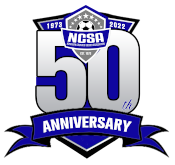There is a new left side menu. There are 2 “parent” menu choices labeled PERSONAL INFORMATION and TEAM MANAGEMENT. Clicking a parent menu item will display the sub-menu choices discussed below. Just above the left side menu it should say “Welcome” and your name. If you have multiple roles, this is where you would switch roles.
PERSONAL INFORMATION – Edit Password
This is the section where you modify your password. Remove all black dots. You must type in the assigned password in the "current password" section.
PERSONAL INFORMATION – Edit Personal Data
This is the section where you edit your address, phone numbers and one email address. Remember to hit “Save” at the bottom. You are not permitted to edit the name.
TEAM MANAGEMENT – Match Day Form (MANDATORY for EACH team)
EACH team must submit its own Match Day Form.
First, if you coach multiple teams – either as head coach or assistant coach in NCSA records, there will be a drop down box listing those teams from which you select the team and then click “Get Games”. If you coach only one team according to NCSA records, your list of games will appear when you click the menu item “Match Day Form”. The Match Day Form is required only for NCSA games.
Second, the entire list of games will appear for the team selected or the only team you coach. The game number in the left column is in blue and is able to be clicked from any time before the game through 24 hours after the game. After that time, you may no longer edit the Match Day Form; however, the right column will display “View”, which may be clicked to view the completed form. IMPORTANT: WAIT UNTIL 1-2 DAYS PRIOR TO THE GAME TO CREATE THE MATCH DAY FORM SO ALL REFEREE INFO IS INCLUDED FOR THAT GAME.
Third, once you click a game number to create a Match Day Form, a form “wizard” displays to guide you to completing the form:
(a) The name of a coach listed in NCSA records as coaching this team will be pre-populated into one of four spaces for coaches – coach names can be removed and replaced – you may add names to a total of 4 permitted coaches per rules – this procedure will eliminate the illegible names on a majority of previously submitted forms;
(b) You must then answer if any players are playing up – it is preset as “no” - if you change it to “yes”, a section will appear for you to list the player’s name, the player’s pass number, uniform number (enhancement in process) and the team from which the player is playing up – again, this procedure will eliminate the illegible names previously written on US Club rosters (you may NOT write names on US club roster forms any longer) – the “add another player” lets you add additional players playing up according to NCSA rules - the teams listed (playing up from) in the drop down are only those teams from which a player may play up – this will eliminate the numerous situations where players improperly played for a team. IF A TEAM IS NOT LISTED IN THIS DROP DOWN, THEN A PLAYER ON THAT TEAM MAY NOT PLAY UP TO YOUR TEAM.
(c) When you are done, remember to click “Save and View/Print” and a PDF version of the form will appear for printing – note that the form will have extra lines for writing in players who are recruited last minute to play up - we understand coaches are accustomed to seeking additional players on a last minute basis and those names, pass numbers, uniform numbers and team playing up from must be entered for the referee – for this season, we are permitting/requiring coaches to return to the form WITHIN 24 HOURS of game time and you MUST add players who did in fact play up on game day. How do we monitor compliance? Referees will report if any players played up and if so, how many. A report compares the numbers reported by coaches and referees and lets us know where they do not match. If you find that you improperly used a player to play up, report it immediately to your division commissioner – your reporting of the infraction will lessen any penalties that would apply.
Fourth, there are many new features on the Match Day Form:
(a) The upper left section is already completed based upon the game number listing date, time, field, teams and flight – this solves the issue of often incomplete information.
(b) The officials’ names are printed on the form provided they are already assigned – for that reason we recommend that you WAIT until Friday to print a form for that weekend – by that time, 98% of all matches have been assigned and accepted.
(c) The upper right portion listing game times, size of ball and referee fees now contains a highlighted section for the flight of the game.
(d) The upper right also displays which team is providing this Match Day Form – EACH team provides one – the delays typical to incomplete and unsigned forms should be solved by each team providing a form – if you do not have your form, referees have been instructed not to permit the game to proceed per NCSA rules.
(e) The coaches are listed here based upon what was recorded by you.
(f) The players playing up are listed (name, pass number, uniform number, team) and you may hand write such information for this season – remember to go back to complete the same information online within 24 hours.
TEAM MANAGEMENT – Score Entry
Scores are no longer reported via external websites or via email or telephone. The same rules apply as to who reports the score (winning team, home team if a draw), but both teams have the ability to enter a score. The same 4 hour rule applies, but for now the ability to enter a score ends after 24 hours. While we are tracking timeliness of score reporting, at this time we are allowing additional time without fines. If you miss the 24 hour window, contact your division commissioner.
NOTE: Games do not show until after they are played.
(a) Enter scores for each team.
(b) If a team was not at the field with minimum number of players within 15 minute of game time, click “yes” and indicate which team (rare situation).
(c) If one of the officials did not appear, click “yes” – this allows us to follow up with officiating crews to determine who was missing and why.
(d) You may enter a short comment for the division commissioner.
(e) You may enter scores only once – if a score is wrong, email your division commissioner.
When done, click “Save” – this will take you to the short Match Evaluation page. We hope you will complete it at that time, but if you are pressed for time, you may return to it later.
TEAM MANAGEMENT – Submit Match Evaluation
Click the game number in the left column to access the evaluation form. There are 3 short, simple sections to address pre-game issues, match level and an overall evaluation of the officials. The first 2 sections allow for comments. If you wish to make comments about an official, you must complete the Detailed Referee Evaluation. We hope every coach will take the time to complete this section. You can go back and view it late by clicking the “View” link in the right column.
TEAM MANAGEMENT – Detailed Referee Evaluation
Click the game number in the left column to access the evaluation form. For a game with only 1 official (small sided), there is only 1 section to complete about the only referee. For a game with more than 1 official, there are 3 sections to complete about the center referee and both assistant referees. Each section allows 2 places for comments. We hope every coach will take the time to complete this section. Once you answer questions for a couple of games, you will see how quick and simple it is to help the league by providing your feedback. We used actual comments from coaches during Spring 2011 to discuss coach/club concerns with referees in Fall 2011 pre-season meetings. You can go back and view it late by clicking the “View” link in the right column.

